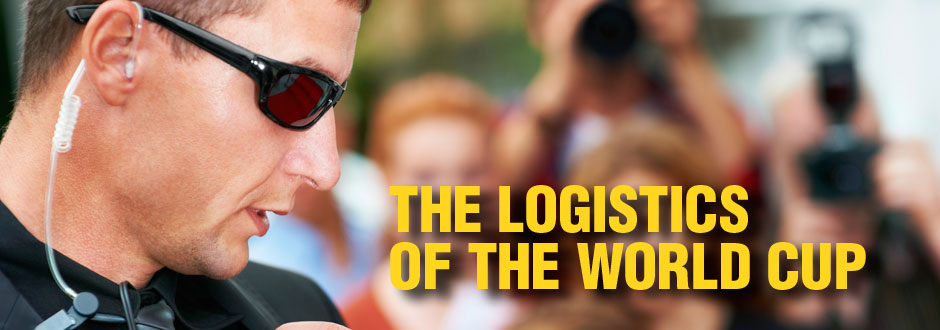Wasp Barcode Technologies: The Barcode Solution People
The Logistics of the World Cup

This year’s World Cup, being held in Brazil June 12-July 13, is arguably the planet’s most popular sporting event. FIFA is expected to collect over $4 billion in revenues; however, hosting such a massive event is no easy task and presents a multitude of logistical issues. As we learned from the recent Winter Games in Sochi, accommodating events like the World Cup always present
asset management challenges.
Managing Assets through Customs and Into Brazil
Although the volume and types of assets moving into Brazil for the World Cup may be different than the 2014 Winter Olympics, the same kind of measures should still be taken to make sure that the necessary assets are tracked to their appropriate locations. If possible, items should be sent in advance and customs regulations should be thoroughly reviewed and followed to ensure there are no delays or fines associated with transportation.
Types of Assets Moving Into Brazil for the World Cup
As with the 2014 Winter Olympics, a large volume of the assets moving into Brazil are not sports equipment. Marketing materials, promotional goods, consumable items, gifts, and other similar items will need to be managed.
Just the sheer number of balls being manufactured and shipped to Brazil is overwhelming. The head of new product development at the company making the balls estimates they will supply more than
2 million Brazuca balls of various grades. According to reports, the
Brazuca balls used in the World Cup games themselves will come with six in-built HD cameras capturing 360-degree view of the on-field action.
Applying Traditional Asset Management Techniques
Barcode systems and related inventory and logistics solutions are arguably the easiest ways to track large volumes of inventory going in and out of Brazil. Barcodes can be used to streamline the process of verifying inventory throughout the events and could be tied into inventory and asset management solutions, like Wasp’s
Asset Management software and Inventory Control systems.
With
tourists spending $3.5 billion in Brazil during the Confederations Cup last year—the dress rehearsal for this year’s big event—the assets and other inventory required to make the 2014 FIFA World Cup a success, should also be at the forefront of consideration.
To better understand the scale of the 2014 World Cup, note the below “World Cup: Your guide to Brazil 2014 in number” courtesy of
CNN:
- 0 -- number of times that Bosnia-Herzegovina has played in the World Cup. The nation, which gained independence in 1992, won eight out of its 10 qualifying matches to win Group G.
- 5 -- number of times Brazil has won the tournament.
- 12 -- games in the 2014 World Cup will be played in 12 Brazilian cities: Belo Horizonte, Brasilia, Cuiaba, Curitiba, Fortaleza, Manaus, Natal, Porto Alegre, Recife, Rio de Janeiro, Salvador and Sao Paulo.
- 36 -- highest tally of goals scored in qualifying by Germany and New Caledonia.
- 59 -- current world ranking of Cameroon, which is hoping to become the first African team to win the tournament. Cameroon, which reached the quarterfinals in 1998, is the lowest ranked side to make it through qualifying.
- 145 -- number of goals scored at the last tournament, the lowest of any World Cup since the competition moved to a 64-game format.
- 245 -- different television channels showed the 2010 World Cup final between Spain and the Netherlands.
- 990 -- cheapest tickets for the final cost $440 while the most expensive are $990.
- 2,898 -- yellow cards shown by referees during the qualifying campaign.
- 3,000 -- number of miles separating the northern city of Boa Vista and the southern city of Porto Alegre.
- 18,449 -- number of volunteers who worked at the 2010 World Cup in South Africa.
- 390,600 -- hot dogs were sold at official venues in South Africa four years ago.
- 750,000 -- liters of beer sold inside stadiums at the 2010 World Cup in South Africa.
- 1 million -- trees which cover the famous Lago de Patos (Ducks Lagoon) in Porto Alegre -- a venue for the World Cup.
- 2.4 million -- residents in Belo Horizonte -- the city which will host Argentina's training base.
- 6.15 million -- ticket requests made during the first phase of ticket sales -- more than 70% of those from Brazil.
- 317 million -- population of the U.S -- the largest population of any qualifier.
- 3.2 billion -- people worldwide who watched the 2010 World Cup -- 46.4 percent of the world.
 This year’s World Cup, being held in Brazil June 12-July 13, is arguably the planet’s most popular sporting event. FIFA is expected to collect over $4 billion in revenues; however, hosting such a massive event is no easy task and presents a multitude of logistical issues. As we learned from the recent Winter Games in Sochi, accommodating events like the World Cup always present
This year’s World Cup, being held in Brazil June 12-July 13, is arguably the planet’s most popular sporting event. FIFA is expected to collect over $4 billion in revenues; however, hosting such a massive event is no easy task and presents a multitude of logistical issues. As we learned from the recent Winter Games in Sochi, accommodating events like the World Cup always present 

